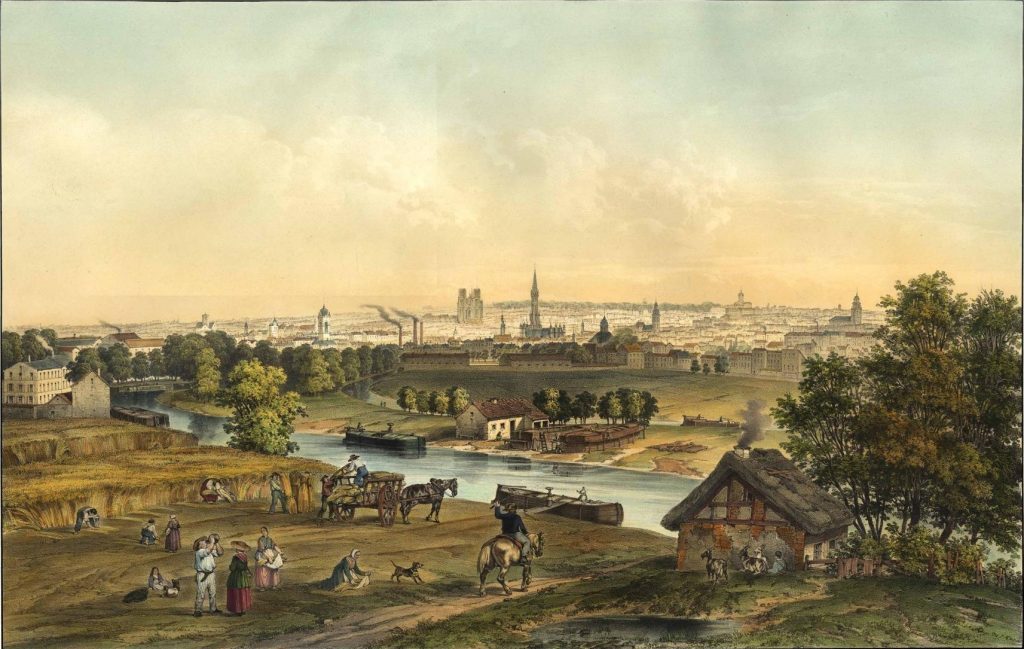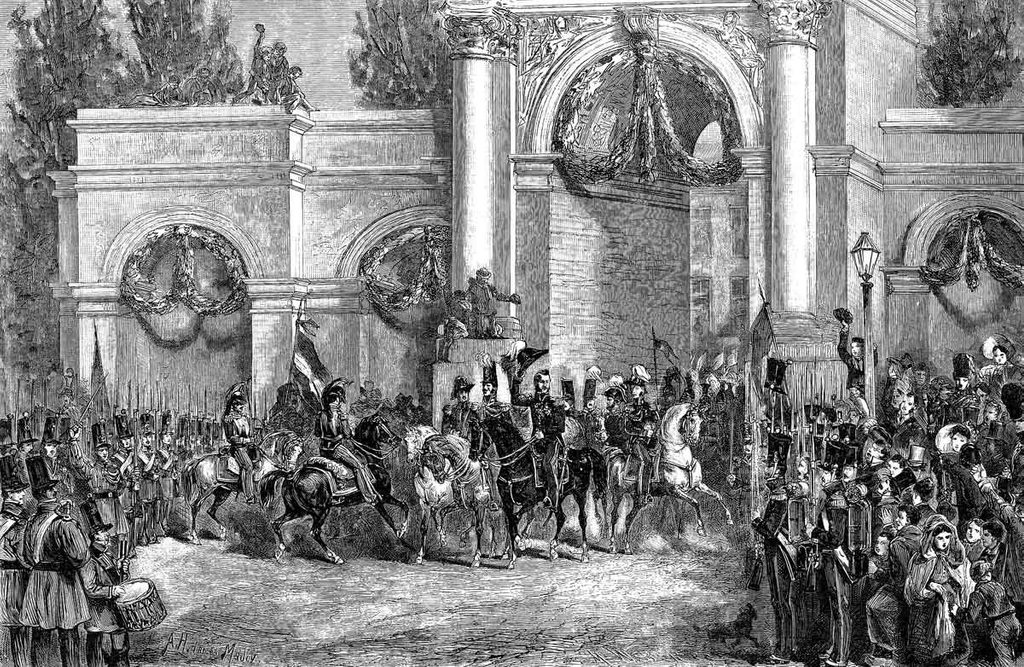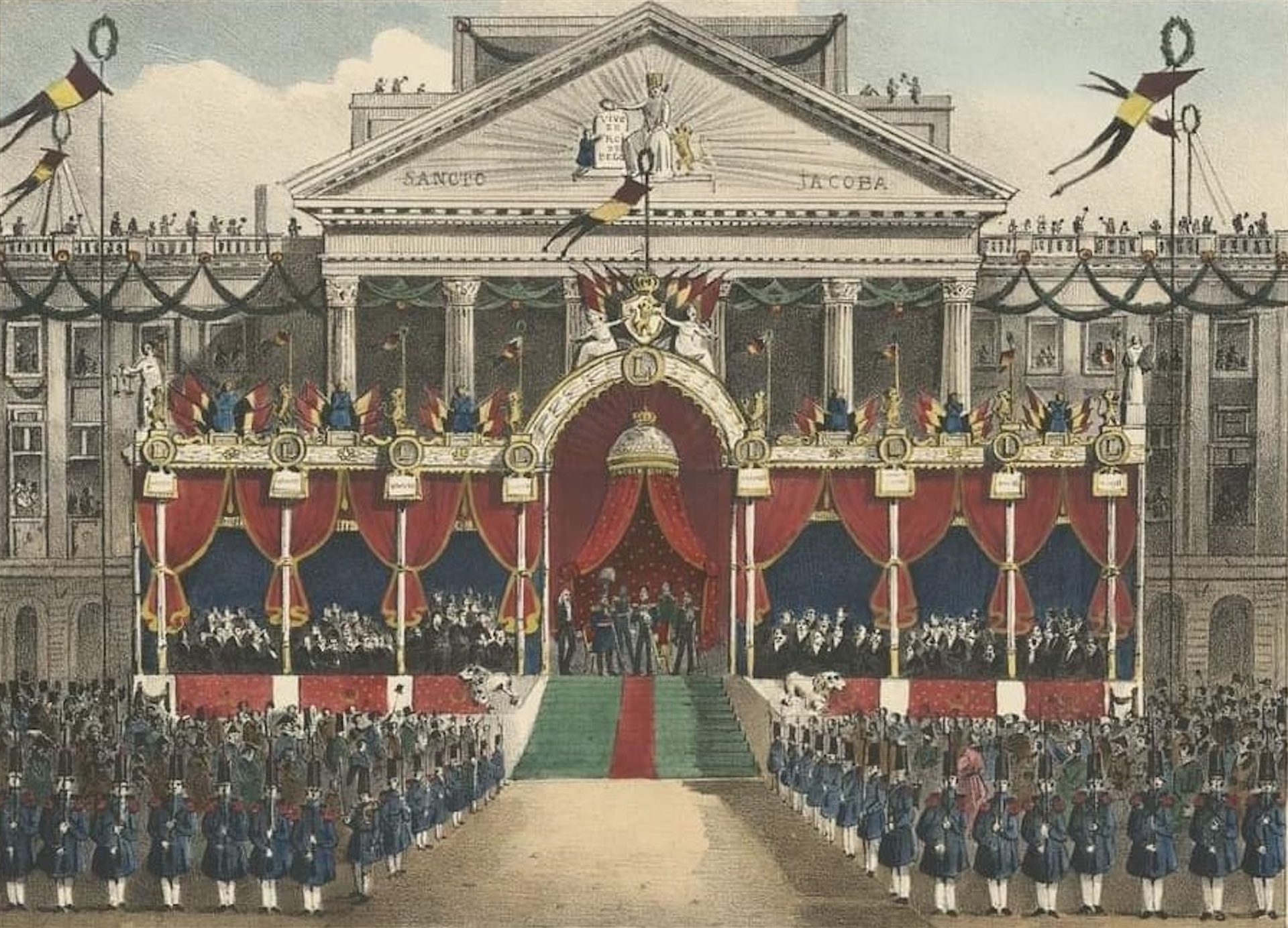On this day, 21 July 1831, Leopold I arrived in Brussels to be crowned the first monarch of Belgium. At a ceremony at the Place Royale, the young prince swore allegiance to a new Belgian constitution written by the national congress.
Workers at the Place Royale had spent the whole night preparing the platform and pavilion which would hold the throne of the new head of state. The pavilion had been constructed with a stage on the steps of the palace, lined with red cloth and gold ornaments symbolising each new region of Belgium.
On the steps of the Place Royale, Léopold of Saxe-Cobourg-Saalfeld was to be crowned King of Belgium.
The square, lined with neoclassical buildings, was at the top of a hill which overlooked the River Senne and the lower part of Brussels, which was described as "neat and cleanly, and presents the most beautiful sight."
After being chosen, Leopold travelled from his residence in London, arriving at Calais and entering the territory of Belgium at the coastal town of De Panne on 17 July. He travelled through Ostend, Bruges, Ghent and Aalst to scenes of rapturous popular joy, drowning out any lingering pro-Orangist sentiment out to spoil the parade. Church bells rang, cannons fired 101 gun salutes as people lined the streets with tricolour flags.

The arrival of Leopold I to De Panne at the Belgian border on 17 July 1831. A statue to mark the event can still be found in the city today.
When he arrived at the Laeken Castle on 19 July, 40,000 people were waiting for him, having been there all afternoon on both carriages and foot to catch a glimpse of their new king. Leopold himself said that it was the most flattering reception he had ever received.
The 21 July marked the end of the Belgian Revolution, and Brussels was enveloped by joyous scenes of victorious euphoria since achieving its independence from the Netherlands. Bloody scenes of popular insurrection against the Orangist rule had been replaced by a spring of hope for a new nation state.
At 10:00 on 21 July, a committee arrived at Laeken Castle to invite the future king to the centre of Brussels, accompanied by a royal escort with the Civic Guard. Leopold, donning the dress of a general in the Belgian army, mounted his horse alone and left Laeken at 11:00.

View of Brussels from Molenbeek along the Brussels–Charleroi Canal, c. 1855. Litho by H. Walter
Along the way, he stopped off in a leafy Molenbeek-Saint-Jean, where he was offered a glass of wine and enjoyed the view of the city from outside the entrance gates. The new monarch then passed through the (now-demolished) Porte d'Anvers at 11:30 into the City of Brussels, where Mayor Nicolas Jean Rouppe symbolically handed him the keys to the city. Rouppe had been mayor of Brussels since the Napoleonic period.
The houses and streets through which the royal escort passed were covered with evergreen festoons, mixed with red, yellow, white and blue flowers. Bells rang and the crowd cheered. All roads had been covered with fresh sand, and three triumphal arches were erected on the north side of the canal, with two others near the entrance into Brussels.

Leopold leaves Laeken Castle and crosses the Porte d'Anvers, on the occasion of his entry into the capital on his way to the Place Royale.
The royal escort travelled across Brussels from the Rue Neuve, the Place de la Monnaie, up to the Place de la Madeleine and up the Mont des Arts before the planned arrival at the Place Royale.
Colourful Brussels greets the King
Earlier, at around 11:00, members of the new Belgian Congress and headed by the Regent, took their place on the royal platform near the throne, with the gathered crowd also exhibiting their adulation and gratitude. The Congress would be replaced by a Parliament the following month, in August 1831.
People had been waiting since 08:00 to see the ceremony, singing renditions of La Brabançonne, La Marseillaise and Le Parisien as they waited, waving the new Belgian flag amid joyous applause and cheers. All around the Place Royale, people could be seen standing on the roofs of the buildings, with the sunny weather adding a greater shine to the festivities.
"It is difficult to give a description of the feelings of the inhabitants of Brussels. They are almost wild with joy… they know that their city, which, while Austrian, was but a provincial capital – while French, a ville de department – and while Dutch, but half the metropolis of the kingdom, as William lived here but one year in every two – is now to assume a new rank in the cities of Europe." – Bell's Weekly Messenger (London) - Monday 25 July 1831.
A cry of "Long live the King!" preceded Leopold’s entry into the square. The monarch climbed up the steps of the Place Royale and the swearing-in ceremony soon began.

The swearing-in of Leopold I, by Gustave Wappers (1831).
After the reading of the new Belgian constitution by a visibly moved Regent, the baron Érasme-Louis Surlet de Chokier, the document was then handed over to the new King.
Leopold read it over, and then rose from his seat and advanced the front. Slowly and distinctly, he read aloud the oath: "I swear to observe the constitution and the laws of the Belgian people, and to maintain the national independence and the integrity of the territory."
A table was then brought, and Leopold signed the constitution. He addressed the Congress and crowd as their new monarch, drowned out by loud and continued cries of "Vive le Roi!"
The cannon fired, the trumpets sounded. Belgium was officially born.
"Today in History" is a historical series brought to you by The Brussels Times, aiming to take you on a trip down memory lane for newcomers and Belgians alike, written and compiled by Ugo Realfonzo & Maïthé Chini.

